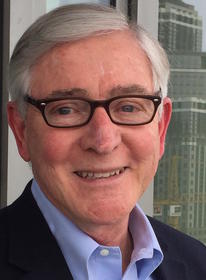Past "From the President" articles
From the President
2018-09: Advocacy, accessibility, and communication

As we start the new year for UMRA, I’m excited by the opportunities and challenges ahead. Many excellent programs and services have been developed by the UMRA membership over the years, and I’m confident we will continue to find even more ways to enhance the experience of retirees and UMRA members.
UMRA leaders gathered on August 9 for the organization’s biennial planning retreat. The 25 participants included board members, committee chairs, University liaisons, communication coordinators, and affinity group facilitators. Chip Peterson opened the session with an overview of UMRA, and John Anderson provided an update on membership and philanthropy.
John reviewed a remarkable report UMRA had requested from the University of Minnesota Foundation (UMF), which revealed that 77 percent of UMRA members are financial supporters of the University. Since the initiation of the U’s “Driven” campaign in 2011, our members have made gifts and commitments totaling more than $22 million. In fact, 94 percent of UMRA members have given to the U during their lifetimes, and the cumulative total of all their gifts is $40.7 million! This revelation of UMRA’s financial clout provided additional energy to the day.
The retreat participants then broke into small groups to explore opportunities and challenges in three areas: advocacy, accessibility, and communication. Below are summaries of their discussions.
Advocacy, facilitated by Bill Donohue. Recommendation: UMRA should seek to have input in the search for a new University president. Retreat participants were encouraged to recommend individuals for the search committee, and UMRA will seek to have a role in the search and final recommendations. The group also discussed the selection of new regents and what role, if any, would be appropriate for our organization. The group suggested UMRA leadership communicate directly with the appropriate administrators to pursue these ends. Other topics considered: working with UMF to develop support for the Professional Development Grants for Retirees program; working with the U’s Center on Aging to support their work; promoting UMRA across the University; and developing opinion pieces on such topics as legislative appropriations and regent selection.
Accessibility, facilitated by Peggy Mann Rinehart. Recommendation: UMRA should pursue establishing regional meetings across the metro area to allow retirees to engage with each other without enduring trips to campus. These meetings could include live streaming or podcasts of UMRA speaker events or could develop into social clubs. Other topics considered: focusing some workshops on issues of death and dying; exploring ride-sharing services; engaging Center for Aging graduate students in UMRA’s programs; providing assistance from the parking garage for members coming to meetings; recording speaker presentations for access online.
Communication, facilitated by Claudia Parliament. Recommendation: Continue improving the UMRA website but move cautiously in creating content for Facebook, Twitter, or other social media channels. Other topics considered: collecting information on how colleges and departments engage their retirees; developing “best practice” awards for units doing exceptional work with their retirees; increasing outreach regarding UMRA as a resource to the University community.
The Board and I are interested in your reactions regarding the ideas raised in these discussions. Please let us know what you think. Your input will provide an important foundation for the work of the Board in the coming year.
— Jerry Rinehart, UMRA president, 2018−19